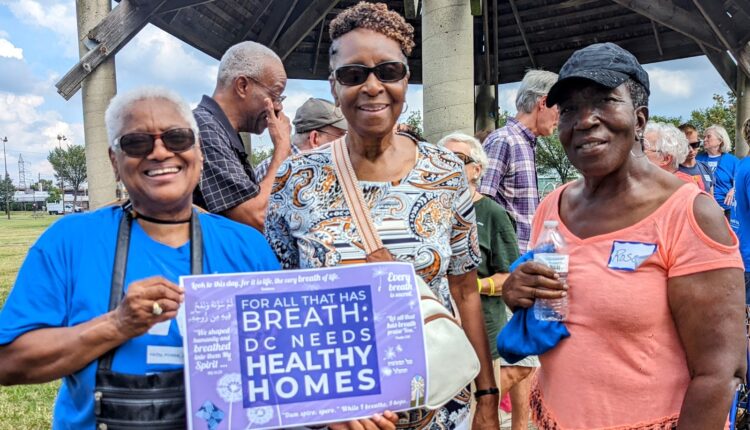
Lewis T. Tait Jr. and Ryane Nickens: DC must address root causes of public safety crisis by prioritizing healthy homes
Gun violence. Rising rents. Wildfire smoke. If your only perspective of DC over the past year came straight from the headlines, you might wonder: What crisis is next? Amid rising concerns around public safety, many voices have clamored for quick fixes, but as native Washingtonians, the two of us know it’s not a tough-on-crime approach but rather a holistic one that will build healthier, safer communities. The Healthy Homes and Residential Electrification Amendment Act — introduced last February by Ward 6 Councilmember Charles Allen and seven other councilmembers — can help achieve this vision by creating jobs, stabilizing utility bills, and assisting in building generational wealth.
The public safety threats facing DC cannot be viewed in a vacuum but are instead a reflection of DC’s affordability crisis and unresolved employment gaps.

In DC, holding a job is not necessarily a marker of economic success. Thanks to decades of racist policies, communities of color have been shut out of good-paying jobs and DC faces the highest unemployment gap between Black and white residents in the U.S. Too often, our young people are stuck in gig work or minimum wage jobs that fail to cover DC’s high cost of living, with no hope for advancement. And time and again, we hear from neighbors who begin promising job training programs but then, because these weeks-long programs do not provide adequate compensation, have to drop out and return to less-promising jobs once bills start to pile up. As a result, thousands are shut out of careers that would allow them to grow their income and support a family.
As wages stagnate, long-term residents face increased pressure from the high cost of energy. Not only are low-income communities often stuck in unsafe, inefficient homes, but gas customers in DC continue to face higher and higher bills to cover the cost of Washington Gas’ $4.5 billion fossil fuel pipeline replacement program. For homeowners on a fixed income, rising energy bills can mean having to put much-needed repairs on hold, keeping the kind of solutions that would increase weatherization and energy efficiency — and reduce their energy bills — out of reach. This harmful cycle can have a lasting impact on our communities: In a 2022 report, the DC Black Homeownership Strike Force, created by Mayor Muriel Bowser, identified “difficulties rehabilitating and maintaining homes” as one of the three major threats to preserving Black homeownership in the District.
The Healthy Homes Act, which would help at least 30,000 low-income households upgrade their homes with clean energy, would provide a leg up for thousands of residents who have been forced to live in dilapidated homes — and to endure the high energy bills that come with them. Not only would this legislation fund much-needed repairs, electrical upgrades and insulation, but it would also cover the cost of highly efficient equipment, such as heat pumps, that can provide heating and cooling. These upgrades would deliver cleaner air to our communities but also result in lower monthly utility bills. In wards 7 and 8, where residents face the highest energy burden in the District, adopting this equipment would make a massive impact on the cost of living, allowing families to put money toward groceries, health care expenses and more.
But the fact remains, how can we expect our neighbors to pay utility bills, buy and maintain homes, and see a thriving future for themselves when we can’t offer them jobs, let alone a career?
We can build a foundation for a green economy right here in DC, ensuring that residents of wards 7 and 8 are the first to access jobs to help build and upgrade these homes. By enacting and funding the Healthy Homes Act, Mayor Muriel Bowser and the DC Council can invest in paid job training programs that would help create a pathway to family-sustaining careers. Currently, a $2 million pilot program is underway in Ward 7 to help upgrade homes with clean energy in the Deanwood and River Terrace neighborhoods — and thanks to already expanded funding from the Sustainable Energy Trust Fund, we could begin work immediately upon passage of the Healthy Homes Act to ensure residents from communities like ours can deliver the health and economic benefits of pollution-free homes across the District.
Violence in DC is a symptom of an underlying crisis plaguing our communities. We must all recognize that we cannot police our way out of this surge in crime but must instead invest in the foundational, long-term solutions that can create a generational shift toward healthier, safer communities. Improved jobs, increased affordability and healthier homes are key pieces of the puzzle. Passing the Healthy Homes Act is an essential first step toward creating a better, healthier future across DC.
The Rev. Dr. Lewis T. Tait Jr. is the pastor of Village Church in Ward 7’s Benning neighborhood and a member of the Washington Interfaith Network. Ryane Nickens is the director and founder of the TraRon Center and a strategy team member of the Washington Interfaith Network.
About commentaries
The DC Line welcomes commentaries representing various viewpoints on local issues of concern, but the opinions expressed do not represent those of The DC Line. Submissions of up to 850 words may be sent to editor Chris Kain at chriskain@thedcline.org.


Comments are closed.